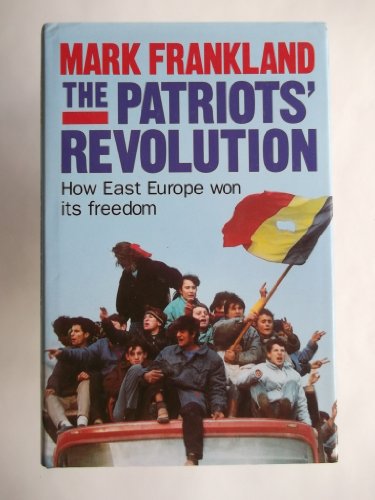Items related to The Patriots' Revolution: How Eastern Europe Toppled...

Synopsis
Analyzes the forces that brought down the communist governments of Eastern Europe with so little bloodshed
"synopsis" may belong to another edition of this title.
Reviews
A whirlwind tour of Communist Europe during the last year of Communism, narrated with insight and restraint by English journalist and novelist Frankland (Richard Robertovich, 1988; Khrushchev, 1967). ``The tragedy of East Europe,'' according to Frankland, ``was that there were decent men among those who imposed Communism, and that it took so long for them to understand that they had taken a wrong turning to the promised land.'' Such understanding was bought at a high price: According to the author, ruined economies, ravaged landscapes, widespread disease, and chronic despair seem to be the only legacies of the old regimes now that the statues have come down and the streets have been renamed. Frankland moves through the region country by country, but he is intelligent enough to make generalizations in each case and weave these narrative threads into a coherent history whose roots go back much farther than the 50 years it can officially claim. The fact that Communism in Eastern Europe was a foreign imposition is not really Frankland's point- -although that is made abundantly clear. He is more concerned simply to let the characters of this weird drama speak their own lines--such as Alexander Dubcek, who, despite his narrow brush with Brezhnev's gallows, could swear in 1989 that he would never hate the Soviets or forsake Marxism (``because I have experienced the joy aroused by the completion of a hydroelectric power station''); or the Romanian woman imprisoned for inducing an abortion, who could vow with equal passion never to give birth ``as long as he [Ceausescu] is still alive.'' The strength of Frankland's approach is that he forces nothing, idealizes no one, and intrudes hardly at all: instead, he offers a straightforward account of a monumental political upheaval, told from the point of view of everyone he met. A superlative exposition, thorough and honest. Frankland conveys the real tragedy enveloping Eastern Europe without closing his eyes or stumbling over the contradictions. -- Copyright ©1992, Kirkus Associates, LP. All rights reserved.
Frankland goes well beyond the tumultuous events of 1989 that saw Eastern Europe emerge from its separation from the West, which "challenged geography, history, and economics." Writing lucidly and intelligently, he elegantly weaves historical perspective into his narrative. In contrast to Peter Laufer's Iron Curtain Rising ( LJ 9/15/91), which covers the events of 1989 and after, Frankland steeps his book in the history of the region. The result is a lively, literate, sensitive, and at times moving account of Eastern European culture and politics with keen historical insights. Frankland has an eye for detail and symbolism, as his comments on an ostensibly unremarkable military cap demonstrate. These hats, worn by the Polish army following the imposition of martial law in 1981, recalled a similar design worn prior to the imposition of communist rule. Points like this make the book all the more enjoyable. For all international affairs collections.
- Joseph P. Parsons, Columbia Coll., Chicago
Copyright 1992 Reed Business Information, Inc.
"About this title" may belong to another edition of this title.
FREE shipping within U.S.A.
Destination, rates & speedsSearch results for The Patriots' Revolution: How Eastern Europe Toppled...
The Patriots' Revolution : How Eastern Europe Toppled Communism and Won Its Freedom
Seller: Better World Books, Mishawaka, IN, U.S.A.
Condition: Good. Former library book; may include library markings. Used book that is in clean, average condition without any missing pages. Seller Inventory # 39540604-6
Quantity: 2 available
The Patriot's Revolution: How Eastern Europe Toppled Communism and Won Its Freedom
Seller: Bear Bookshop, John Greenberg, Brattleboro, VT, U.S.A.
356pp. 8vo Gray boards and black cloth back Library discard with all marks, else VG+/VG+ 0-929587-80-4. Seller Inventory # 11472102502
Quantity: 1 available
The Patriots' Revolution: How Eastern Europe Toppled Communism and Won its Freedom
Seller: The Book Spot, Sioux Falls, MN, U.S.A.
Hardcover. Seller Inventory # Abebooks203288
Quantity: 1 available

